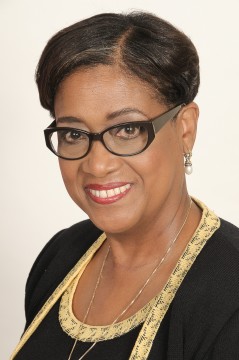Interview: Urban League’s New President Rosalyn McPherson on Regaining Relevance

Rosalyn McPherson.
Rosalyn McPherson is the new CEO of the Urban League in Philadelphia, taking over for 13-year veteran Patricia Coulter. McPherson, 61, has spent most of the last decade at the head of the Roz Group, a Center City communications firm.
She talked to Philly Mag about the organization, its need to build a broader membership, and about the need for African-American organizations to take on leadership roles in Philadelphia
You have been an Urban Leaguer longer than you have been a Philadelphian. You were with the organization in Northern Virginia before you moved here 14 years ago. So maybe you have a unique perspective on this question: How does the Urban League help make Philadelphia a better and stronger city?
I feel that a traditional organization like Urban League ensures that there is a voice for issues that affect African-Americans in particular but you know, a number of minority communities. It’s important to have those kinds of organizations with a structured, organized voice to press forward with issues that continue to challenge our communities.
The organization, as I understand it, it has 500 members here. It offers services in everything from job assistance, to housing, to scholarships, and yet the league doesn’t always seem to have maybe the highest profile in the Philadelphia community. I know you’ve got a PR background: What should the Urban League be doing to get the word out about itself here in Philadelphia?
Well, that’s one of the initial things I want to look at. I believe that Pat was very successful at bringing the national conference to Philadelphia last year and I do believe that significantly upped the profile. But I do think that often people are still asking the question, “What do they do?”
It’s important to increase that membership because 500 is a small number for a city with the population of African-Americans and corporate citizens that we have. So I think that there’s some work to be done increasing membership and attracting that next generation of people to the organization.
As you take the reins here, the leadership of the NAACP in Philadelphia has been suspended and now they’re starting an old investigative probe against Jerry Mondesire. You don’t do what the NAACP does exactly, but you do have an overlap of support and partisans. Does Philadelphia particularly need your organization to step forward at this point?
I’d rather stay focused on what my charge is with Urban League. There are several organizations that attempt to do similar kinds of things but this affiliate is part of a national organization that is still moving forward. It is very focused on empowerment issues through education, employment, and entrepreneurship and those are very specific goals and there’s a lot of work to be done around those particular things. So, for me it’s a matter of getting in now into this as an inside person, as a leader of an organization assessing where we really are because it’s one thing to assess from the outside and another to delve into this as the official leader and I really want to intimately study where we are so that I can figure out what makes sense in terms of moving forward.
Let’s talk about education for a second right because that of course is always a big topic in Philadelphia. We seem to be split right now between those who feel like we should put our shoulder entirely into public education and those who think that we should be creating alternatives. And I’m wondering if that’s something that you’ve thought about, if that’s something the Urban League plans on maybe weighing in on a little bit more?
Well, I think that it makes sense to sit down with our superintendent and get a very clear sense of what his expectations are from this organization. Technically speaking I’ve been in education for most of my career. I’m not necessarily an educator even though that’s how I started, but I’ve been a curriculum developer for most of your major textbook companies. So the problems we have in Philadelphia are not unlike what most urban school systems deal with around the country. That’s something we studied on behalf of some of the Roz Group clients in the past five years.
We have to look at the fact that charter schools are not out-pacing public schools so you can’t say that that’s the key answer. So again I think that it’s important for me to bring my unique background and perspective on education into this new role and see how the Urban League can best support the goals and the initiatives that the school district and the city are putting out there and, you know, see what we can do to really support those efforts because I’m very committed to improving the quality of education. It’s something I’ve been involved in for 40 years at this point so, you know, now I want to see what I need to do with the new limbs.
Last question then: How do you think we’ll be seeing you make your mark on the Union League of Philadelphia?
Well that’s a good question, because I’m very new at this so my style is to study first and then customize — because I have to make sure I’m carrying forward the best of what has already been happening and then bringing to that my unique spin.
So, I’m going into a situation where Pat Coulter is leaving this role with things in very good standing, so I’ve got to make sure that I continue to build upon what has worked successfully, and then augment that with some new things that are gonna attract a new audience if we’re looking at long-term sustainability and relevancy, because relevancy is a key issue too.
Follow @JoelMMathis on Twitter.


